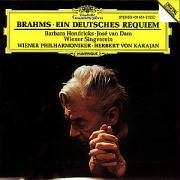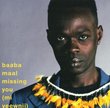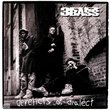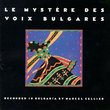| All Artists: Johannes Brahms, Herbert von Karajan, Vienna Philharmonic Orchestra, Rudolf Scholz, Barbara Hendricks Title: Brahms: Ein deutsches Requiem Op.45 Members Wishing: 0 Total Copies: 0 Label: Deutsche Grammophon Release Date: 11/8/1991 Genre: Classical Styles: Opera & Classical Vocal, Historical Periods, Early Music, Modern, 20th, & 21st Century Number of Discs: 1 SwapaCD Credits: 1 UPC: 028943165129 |
Search - Johannes Brahms, Herbert von Karajan, Vienna Philharmonic Orchestra :: Brahms: Ein deutsches Requiem Op.45
 | Johannes Brahms, Herbert von Karajan, Vienna Philharmonic Orchestra Brahms: Ein deutsches Requiem Op.45 Genre: Classical
What could be wrong with this disc--Brahms' beloved Requiem, interpreted by Herbert von Karajan and the Vienna Philharmonic, sung by José van Dam and Barbara Hendricks? Nothing. Karajan here rejects idiosyncrasies and... more » |
Larger Image |
CD DetailsSynopsis
Amazon.com What could be wrong with this disc--Brahms' beloved Requiem, interpreted by Herbert von Karajan and the Vienna Philharmonic, sung by José van Dam and Barbara Hendricks? Nothing. Karajan here rejects idiosyncrasies and histrionics, in favor of a straightforward, impeccably balanced, lushly romantic performance that is, in a word, irresistible. And the soloists have seldom sounded better. --Joshua Cody Similarly Requested CDs
|
CD ReviewsSinging, tuneful performance Blygman | Paris, France | 04/14/2002 (5 out of 5 stars) "I just compared Klemperer/Gardiner/3 Karajan's versions/Masur/Barenboïm /Shaw. This is the one I prefer because of the singing tempo, the articulation is just superb, very tuneful. If only, the solists were rather the Janovitch & Meyer combo of another Karajan's version but whose rythm is too flat & bland compared to this one, the ideal match would be met. I also really liked Rodney Gilfry in Gardiner's version & Janet Williams in Barenboïm's." Karajan >> Avid Reader | Franklin, Tn | 10/17/2003 (5 out of 5 stars) "As important as Brahms is to the Classical world and as great as his music is, it would be a far lesser thing without the incredible interpretation of von Karajan. I choose to look past all the many criticisms - too stolid, too slow, too grand, too careful - and look at the final product. Brahms inhabited Karajan's soul as no other composer with the possible exception of Richard Strauss. I have the Symphonies (two versions), the Concertos and now the Requiem. The music is simultaneously beautiful and touching, moving on several levels. I have often wondered about the artists and their fount of inventiveness. What is Brahms "trying to say"? This is not the traditional Requiem of a Verdi, Mozart, Schubert or Beethoven. No, it is more a celebration of the human spirit. If you must get only one version, this is the one. The voices are clear, the orchestra just the right tone, the longing and "Germanenss" of the music stand out above all. It has that haunting forest mood that inhabits so much of Brahm's music." Karajan's last German Requiem is the saddest and most staid Santa Fe Listener | Santa Fe, NM USA | 02/19/2008 (5 out of 5 stars) "Karajan produced one of the great documents in the postwar era when he recorded the German Requiem in the rubble of 1947 Vienna. That radiant spiritual account, with the incomparable Hans Hotter and Elisabeth Schwarzkopf as soloists, should be the starting point for anyone exploring Brahms's greatest choral work. Karajan continued to feel an affinity for it and produced no less than three later versions in stereo, of which this digital account, also from Vienna, is the last -- in his end was his beginning.
It is solemn, at times staid, and full of power. If you identify late Karajan with glossy surfaces and glib interpretations (an ovr-generalization that made the great Carlos Kleiber, among others, bristle), never fear. Everything here is profound and touching. The recording is exceptionally fine -- the best of all his versions -- and Jose Van Dam is particularly strong in the baritone part, sounding deeply involved and dramatic. Barbara Hendricks produces an easy, honeyedlyricism in the Traurigkeit movement. I had overlooked this 1985 recording in my enthusiasm for the 1947 original, but it's touched by greatness in its own right." |

 Track Listings (7) - Disc #1
Track Listings (7) - Disc #1








